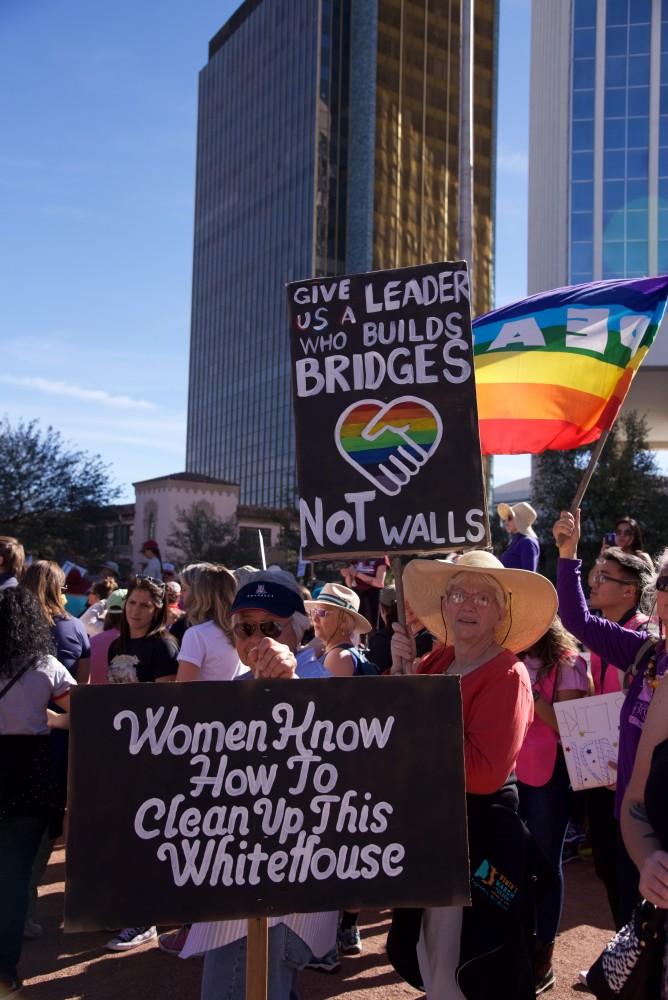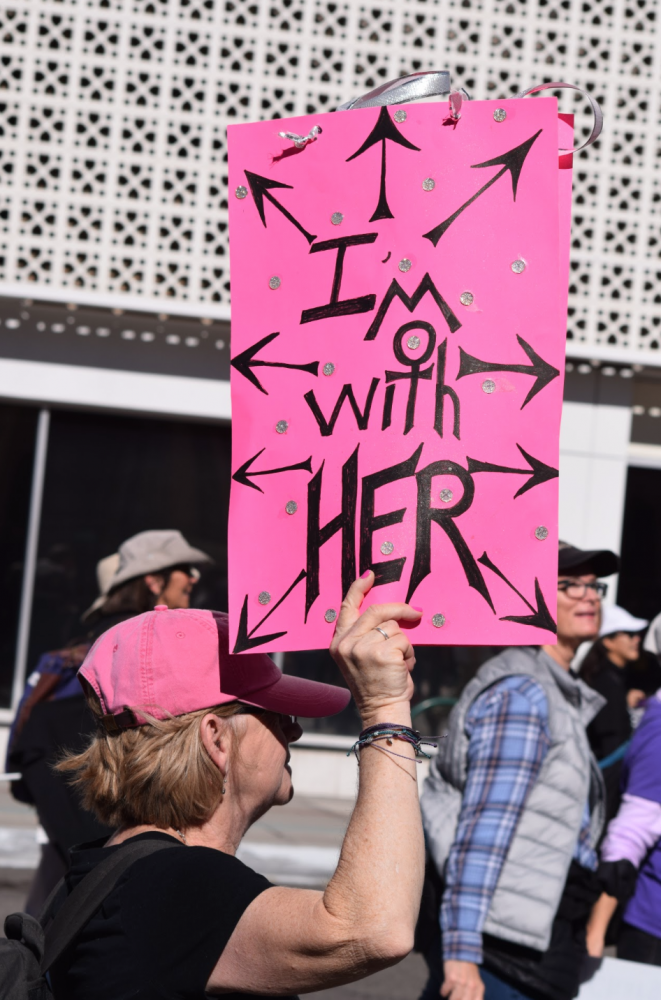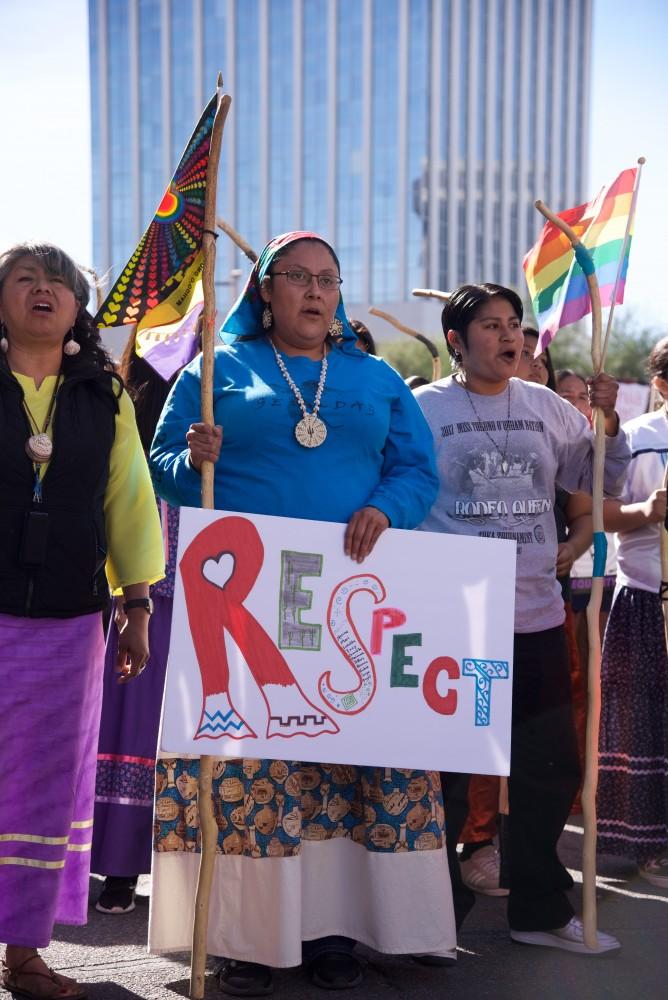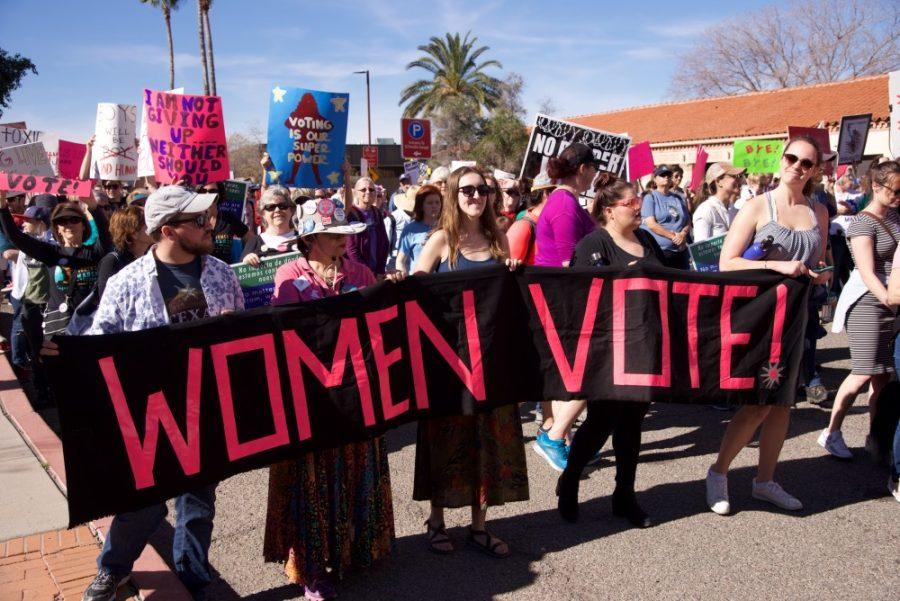Hundreds of people of all different ages and backgrounds marched at the 2019 Tucson Women’s March at the Jácome Plaza downtown on Jan. 20. This was the second Women’s march held in Tucson.
The event included marching, chanting, music and speeches given by many local activists, including Sam Cloud, president of Tucson Pride, and Peris Lopez, a Catalina Foothills High School senior who works with the Tucson Chapter of the March for Our Lives Movement. Speakers discussed issues such as sexuality, gun control, LGBTQ rights, women in the workplace and immigration.

Although the march was officially bipartisan, which was one of the requirements of the event’s fiscal sponsor, the YMCA of Southern Arizona, it was not non-political. Many people marching were marching for political reasons.
Common reasons heard for attending the Women’s March were related to President Donald Trump.
RELATED: UA women share their thoughts on Trump’s first 100 days
When people were asked what they still think needs changed since the introduction of the Women’s March, Debora Light, 64, from Oregon said, “personally, I would like to see our president, not because he’s republican but because of his immorality and his criminality and his lying, to be out of office.”
Among the progress since the first Women’s March in 2017 was the fact that more and more women are getting elected to congress.
“This all began when Trump became president and women stood up and said ‘this is not what we want,'” said Deanna Bisley, a retired dean of technical education.
Students from the UA attended the march as well. Zach Witter, 20, who is studying art history, marched with his sister Hannah Witter. Witter had somewhat of a different take on the Women’s March.
Witter stated he did not exactly feel represented by the women that attended the march, citing the abundance of older, white female marchers.
“A lot of them are like neoliberal and are not to be trusted farther than you can throw,” Witter said. “There’s a lot of problematic and white feminism, and that’s the majority of the people here.”
Inclusivity was something the march organizers strove for, according to Cynthia Bistrain, chair of this Tucson Women’s March. Prior to the march, organizers released statements condemning the anti-semitism and white supremacy that the national Women’s March has been accused of, though the Tucson Women’s March was not affiliated with Women’s March, Inc., which organizes the national march.

“I know that there’s people that are hurt and feel that there is not enough inclusivity, and I’m sure we can do better the next time,” she said. “So definitely, it’s a topic that leads to difficult conversations, and what I know about our team is that we are willing to have the difficult conversations.”
Some aspects of the event were clearly created with accessibility in mind. The speeches were trilingual, delivered in English, Spanish and American Sign Language.
Certain events and speakers brought awareness to the indigenous peoples of Southern Arizona.
The march was lead by Toka players from the Tohono O’odham Nation. A blessing was performed prior to the march and several speakers addressed issues related to Native American rights.
“Most of the time indigenous women or indigenous people are not included in these spaces,” said April Ignacio, a founding member of Indivisible Tohono who spoke about the epidemic of missing and murdered indigenous women. “And the organizers went out of their way to ensure we would be a part of this march because Tucson is O’odham land.”

When organizing the event, media chair Halli Lyons said an emphasis was placed on local activism and issues important to Southern Arizona partly because the march was completely organized by community members.
“We are really really focused on Southern Arizona. We want to make change in the country and in the world and beyond, but I think we have to start where we are,” Lyons said.
After the initial Women’s March in Tucson in 2017, there was no march in 2018. Bistrain said that she and other former attendees discussed on Facebook the idea of putting together a march for the next year.
RELATED: Local, national groups recognize Women’s History Month
Planning meetings were held in different locations throughout the city to try to increase accessibility for people interested in helping, Bistrain stated.
Adhering to the idea of community involvement, a meeting will be held in the weeks after the march for the organizers to hear community feedback.
“This event belongs to the community,” Bistrain said. “It doesn’t belong to me or to the organizing committee or anyone, it belongs to the community, so we’re going to want to hear from the community to see what’s next.”
Bistrain was not certain if she and her team would organize another march next year, but they had been discussing the possibility.
For the immediate future, Bistrain, Lyons and other women who participated in the event said that they hoped the march inspired concerned citizens to find a cause they care about and continue to fight for it.
– Margaux Clemente and Mekayla Phan contributed to this article
Follow the Daily Wildcat on Twitter









